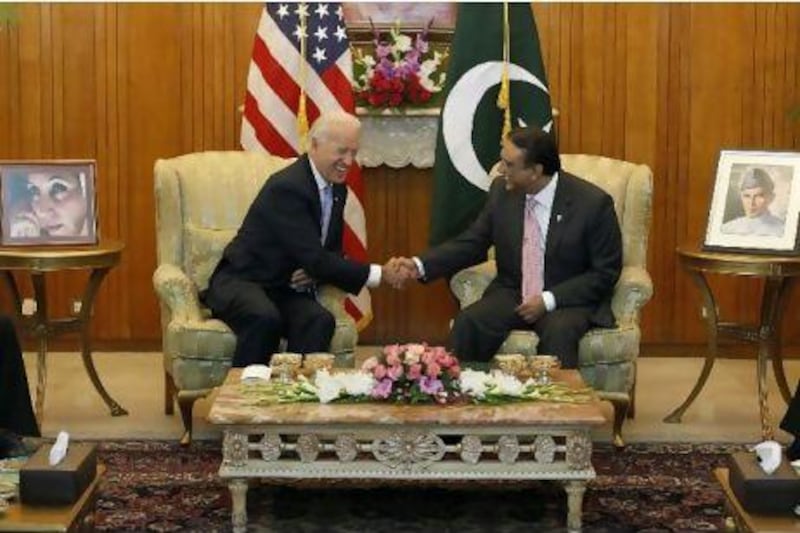WASHINGTON // The Pakistani president, Asif Ali Zardari, arrives in Washington this week to speak at a memorial on Friday for Richard Holbrooke, the late US special representative to Pakistan and Afghanistan.
The visit comes at a time of strained US-Pakistani relations and Mr Zardari is expected to hold talks with senior US officials, including Hillary Clinton, the US secretary of state, during his week-long visit.
The US has been growing increasingly unhappy with the inability and unwillingness of Pakistan's army to clamp down on Afghan Taliban fighters who seek refuge in Pakistan's western border regions.
The lack of a concerted Pakistani effort to close its border with Afghanistan to Taliban fighters was cited by a US intelligence report in December as a major hindrance to US military efforts in Afghanistan to quell the ongoing insurgency there.
At the same time, analysts say, the US is aware that Pakistan's room for manoeuvre is limited. Mr Zardari will be keen to drive home the point that amid natural disasters, political instability and economic crisis, Pakistan needs patience and assistance from Washington, rather than pressure.
Arif Rafiq, a Washington-based analyst and editor of The Pakistan Policy Blog, said Mr Zardari was likely to use his visit - which is primarily to attend the Holbrooke memorial and is not an official state visit - as a chance to engage senior officials in Washington.
"He wants to shore up support for his fledgling government," said Mr Rafiq, who argued that there was declining support for Pakistan's civilian government in Washington. "I think Washington would prefer to engage with a civilian government that is more likely to go after militants and less likely to support them."
That was the message that Joe Biden, the US vice president, brought to Pakistan where he arrived after a surprise visit to Afghanistan.
"It's going to require more pressure on the Taliban from Pakistan's side of the border, than we've been able to exert so far. And there are many hard days that lie ahead," Mr Biden said at a joint news conference with the Afghan president, Hamid Karzai, before leaving for Pakistan.
Yet US officials will also be aware that there are limits to the amount of pressure they can reasonably bring to bear on Pakistan.
"The key issue is that there is a fundamental strategic difference of opinion [between the US and Pakistan] on Afghanistan," said Kamran Bokhari, the director of Middle East and South Asia analysis at Startfor, a Texas-based global intelligence company.
Mr Bokhari said the US wanted Pakistan to help it achieve its primary strategic aim to stabilise Afghanistan in the short term by expanding its counterinsurgency operations to include Afghan Taliban actors.
This is a key year for the US administration in Afghanistan. The US wants to show enough progress to begin at least a cosmetic drawdown of troops in Afghanistan as it has promised, before 2012 and the presidential elections, and in preparation for finally leaving in 2014.
But Pakistan's strategic priority is different, Mr Bokhari said. The current Pakistani counterinsurgency focuses on Pakistani Taliban fighters and al Qa'eda, and does not include those that fight in Afghanistan. While this is not enough for the US, it comes from a focus on the day after US troops leave Afghanistan.
"The Pakistanis say: 'Why should we fight those who are not fighting us? You have a home to go to, we don't'," Mr Bokhari said. "The strategic objective of Pakistan is that once the US is done doing what it is doing, Pakistan will be in good shape."
And Pakistan is not in good shape now. A key supporter of the Zardari government, Salman Taseer, the governor of Pakistan's Punjab province, was assassinated earlier this month in Islamabad. The assassination of the liberal politician came in a climate of growing religious intolerance and amid an insurgency that shows little sign of abating.
Economically, meanwhile, the country has been unable to follow through on International Monetary Fund reforms, invoking criticism last week from the US State Department, and the country is nearing bankruptcy.
In addition, massive floods last year left nearly 200,000 people homeless and caused an estimated US$10 billion in damages.
In that context, US pressure on Pakistan is unlikely to yield much result.
"None of the major actors has a set of really good options," Mr Rafiq said. "The US administration is dependent on [Pakistan's] military, which is refusing to go into North Waziristan, and [the US] really has little leverage with which to change Pakistani behaviour."
Although Mr Biden brought a tough message to Pakistan, said Mr Rafiq, in all likelihood, he will announce more US aid to the country.
"That's really all that the US can do."





